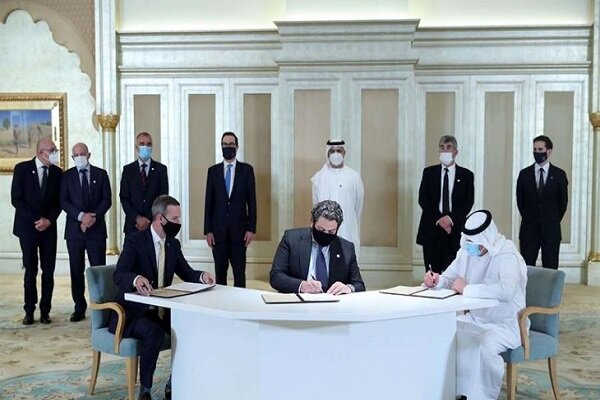One month after signing a normalization agreement between Bahrain and the United Arab Emirates with the Zionist regime under the support and supervision of the United States of America, officials of Bahrain and the UAE have begun visiting Israel. On one hand, the US Treasury Secretary Steven Mnuchin last week travelled at the lead of an American delegation to the Occupied Palestinian Territories, Bahrain and the UAE—a tour which took place during 17 and 20 October. One the other hand informed forces recently announced that Benjamin Netanyahu, the Prime Minister of the Zionist regime, is going to visit the UAE and Bahrain in the coming days. This would be the first visit by Netanyahu to Abu Dhabi and Manama. No specific date has been announced for this visit and various sources have not revealed any details about it.
Also, the Ministers Council of the UAE, headed by the State Minister visited the occupied territories Tuesday. That was the first official visit by an Emirati delegation to the Occupied Palestinian Territories after signing the normalization deal last month between Israel and the United Arab Emirates.
Now the main question is: what are the main objectives behind such visits and travels? And what specific agendas do the American and Israeli sides—specifically Donald Trump and Benjamin Netanyahu—have in mind?
First, it should be noted that there is currently a strategic alliance between the Trump administration and the far-right radical government of Israel led by Benjamin Netanyahu. This strategic alliance has been formed over the past four years. It could be concluded that the US government has rendered the biggest financial, military and political support to the Israeli regime in the Middle East and has paid costs for such extensive support. It should be noted that Barak Obama, the former president of the United States supported the Two-State Solution repeatedly in the Occupied Palestinian Territories and return to the borders of 1967. However, the relocation of the US Embassy in Israel from Tel Aviv to Beit-ul Moqaddas during the Trump administration tenure as well as the sale of sophisticated weapons to Israel by the US indicated that the incumbent administration in Washington is trying to maintain and stabilize the military supremacy of the Zionist regime in the Middle East region. Also, during the election campaigns, the Republicans led by Trump himself benefit from his close relations with Israel as a winning card; therefore, any defeat by the Republicans and victory of Democrats in the upcoming elections can cause a tremor in the present strategic relations between the United States and the Zionist regime. Therefore, Netanyahu and Trump, already fearful of a defeat in the presidential elections, are trying hard to expedite normalization of relations between some Arab countries and especially the UAE and Bahrain with the Israeli regime. On the other hand, the ongoing growing protests in the Occupied Palestinian Territories against Netanyahu and his wife accused of financial corruption and the expansion of social gap in the Jewish community have motivated the Zionist prime minister to seriously follow up under the present conditions the normalization and establishment of relations with Bahrain and the UAE in order to cover up his corruption.
As with the US and upcoming presidential elections, it should be mentioned that at the present time, due to the economic issues and problems caused by the outbreak of Covid-19, the US government and especially Donald Trump are not enjoying a reliable and appropriate status in competition with the Democrats. Moreover, it is necessary to mention that the establishment of normal and close relations between Israel and the southern littoral states of the Persian Gulf was one of the main campaign slogans of Trump four years ago. In this connection, Trump had individually underlined that Israel should be enjoying more respect among the Arab nations. Therefore, we witnessed serious efforts by the American officials under various initiatives and titles for the establishment of official diplomatic relations between Tel Aviv and Riyadh, Manama and Abu Dhabi. Until now, the issue of the normalization of relations between Israel and the UAE and Bahrain has been revealed openly.
During the past years, some serious obstacles had caused relations between Arabs and Israel to remain non-normalized. However, new developments such as the continued defeat of the Zionist regime and Arab reactionary forces in the Syria and Iraq crises and the expansion of the activities of the axis of resistance in the region caused Trump to spotlight in his agenda once again the issue of the normalization of relations between Israel and some of the Persian Gulf countries with a view to gaining victory in the upcoming presidential elections and attracting more support from influential Zionist lobbies such as AIPAC.
Therefore, it could be concluded that the main goal of the visit by the American delegation to the Persian Gulf region and the Occupied Palestinian Territories, as well as the probable visit of Benjamin Netanyahu to the UAE and Bahrain, is to establish reconciliation and peace between such countries and confront states that are opposed to any rapprochement with the Zionist regime, mainly Iran and the resistance forces in Palestine and Lebanon. Another objective envisaged for the recent visits by senior American officials to the Middle East is to mobilize these countries against the so-called ‘Iranian threat’ and set up an arrangement to provide regional security in cooperation with them. In the meantime, these visits and journeys could be considered in line with establishing a NATO-like force of Arabs and Israel. In any way, the issue of the normalization of relations between some Arab countries and Israel is being seriously pursued to procure legitimacy for the Zionist regime in the Middle East—an issue emphasized and followed up by the US president to demonstrate that he has succeeded in bringing an opening in relations between Israel and Arabs and that previous presidents of the United States failed to put an end to Israeli-Palestinian conflict.










0 Comments